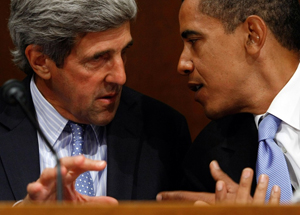 Washington, Jan 24: Putting the Khobragade affair behind them, the United States hopes to move forward the "broad" and "strong" strategic partnership between "the oldest and the largest democracies in the world."
Washington, Jan 24: Putting the Khobragade affair behind them, the United States hopes to move forward the "broad" and "strong" strategic partnership between "the oldest and the largest democracies in the world."
The sentiment was expressed by US Deputy Secretary of State Heather Higginbottom Thursday at a reception hosted by Indian Ambassador S. Jaishankar at his residence to celebrate India's 65th Republic Day on Sunday.
Attending the reception "on behalf of President (Barack) Obama and the people of the United States," the US official said "India's Republic Day reminds us of the strength of India's democratic institutions and traditions."
"And it also reminds us of the strength of the ties between our people and our governments," Higginbottom said. "As we often say, we have a strategic partnership between the oldest and the largest democracies in the world."
Noting that Jaishankar, who played key role in negotiating the landmark India-US civil nuclear deal, "has a very long and distinguished history of strengthening the partnership between our two nations," she said: "I look forward to working together with him to continue those efforts."
US and India "have a broad range of joint efforts and shared interests that keep propelling us forward," Higginbottom said listing among others their space cooperation, homeland security dialogue, health initiatives, work on climate and energy issues and education cooperation.
The two countries' "strong trade and investment ties fight poverty and drive growth in both countries," she said noting, "We have reached close to $100 billion in bilateral trade each year - numbers that we expect to see increase in the coming years."
"Beyond our bilateral relations, we are strong partners in building an international framework to underpin continued peace and prosperity," Higginbottom said.
"Our regional dialogues, including the US-India-Japan trilateral exchange and the ASEAN Regional Forum, have helped develop a shared vision for stability in Asia and the Indian and Pacific Oceans."
"The bottom line is that this partnership is broad and it is strong," she said expressing confidence that "this relationship will continue to grow for the benefit of all our people."
Meanwhile, at the State Department Spokesperson Marie Harf noted US Secretary of State John Kerry and Indian External Affairs Minister Salman Khurshid had met Wednesday on the sidelines of the Geneva II talks.
"I think the fact that the Secretary sat down with his counterpart to discuss the whole range of issues we deal with India on is a sign that the relationship is moving forward and that we have a lot of work to do," she said.
Asked of the khobragade affair was discussed at the two ministers' meeting and its outcome, Harf said: ".we're trying very hard to move past this. And I know the Secretary believes that as well."
"So again, we'll keep having discussions with the Indian Government when they raise them, but we are very focused on moving the relationship forward."






Comments
Add new comment